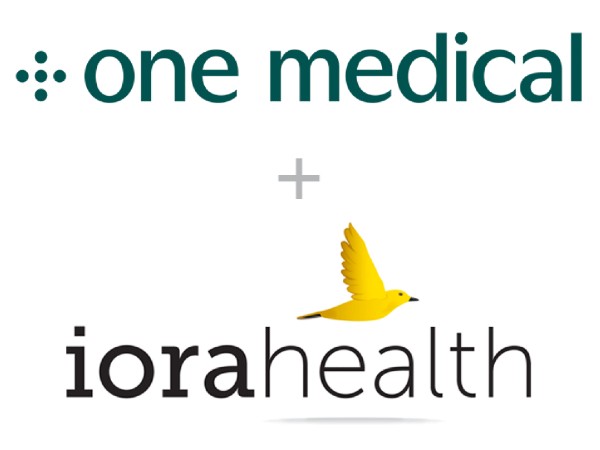 M&A activity in the healthtech space has exploded in the last year and a half, despite, or maybe because of, COVID: according to Mercom Capital, there were 184 M&A transactions in 2020, up 9 percent compared to 169 in 2019, and in just the first three months of 2021 were were already 30 companies in the space that were acquired.
M&A activity in the healthtech space has exploded in the last year and a half, despite, or maybe because of, COVID: according to Mercom Capital, there were 184 M&A transactions in 2020, up 9 percent compared to 169 in 2019, and in just the first three months of 2021 were were already 30 companies in the space that were acquired.
The latest healthcare merger is between two companies that offer similar services, but to very different populations.
On Monday, it was announced that Iora Health, a company that which works with insurers and employers to create private practices that are catered to specific communities, specifically Medicare patients who are over 65 years old, has been acquired by primary care platform One Medical.
As per the acquisition, Iora Health shareholders will receive 56.1 million shares of One Medical common stock, based on the closing share price of One Medical’s common stock of $35.59 this past Friday, valued the transaction at approximately $2.1 billion.
When the deal is completed, which is expected to happen in either late Q3 or Q4 of this year, following approval by One Medical and Iora Health stockholders, a yet unnamed designee of Iora Health will join the One Medical Board, while Rushika Fernandopulle, Iora Health’s current CEO, will become Chief Innovation Officer at One Medical.
Founded in 2011, the mission of the Cambridge, Massachusetts-based Iora Health is to “treat the whole person” meaning that it creates a deeper relationship with each patient. That means setting goals with the patients, “enabling them to become active participants in their own well-being.”
Each practice that it creates is set up to address the needs of that specific community. For example, it has created one in Phoenix, Arizona that caters to older people on Medicare, so it has earlier hours, has more bathrooms, wider waiting rooms and more geriatric doctors.
Each practice features a team consisting of a provider, Health Coach, Behavioral Health Specialist, Team Nurse, Clinical Team Manager and an Operations Assistant, all of whom work with each person. Each practice also includes a telemedicine platform, and a payment system where patients are not billed on a transactional basis, but rather on based on care.
“Iora teams see fewer patients than traditional primary care practices. Our providers have panels that are a third the size of traditional primary care panels. We can do this because of our relationship based care model. By providing high impact, relationship based care, we are able to keep our patients healthier, saving on total medical expenses. This often saves the patient money, as well as the health care system,” Fernandopulle told VatorNews in an interview in 2018.
One Medical also runs its own practices; for less than $200 a year, patients get access to health professionals, 24/7 virtual care, and same-day appointments. They are able to enjoy more quality time with their provider during longer appointments, they can e-mail their provider directly with follow up questions, get access to 24/7 phone support and stay connected and on top of their health with the One Medical mobile app. Patients can also schedule same- or next-day appointments via phone, app or online.
The company currently has locations in Atlanta, Austin, Boston, Chicago, Los Angeles, New York, Orange County, Phoenix, Portland, San Diego, Seattle, the Bay Area, and Washington, D.C., with locations coming soon Dallas-Ft. Worth, Columbus, Houston, Miami, and Raleigh.
In a blog post, Amir Dan Rubin, Chair & CEO of One Medical noted that, in addition to both companies running and operting their own clinics, the two companies also have an aligned vision to what the future of healthcare should be.
“One Medical and Iora both believe that in order to truly transform health care, we must simultaneously serve the needs of multiple key stakeholders in the healthcare ecosystem, which includes consumers, employers and payers, care providers, and health networks. Our human-centered and technology-powered models position us to simultaneously address the needs and frustrations of these key stakeholders,” he wrote.
Where the two companies have differed is in the populations they serve, with One Medical primarily serving the commercially-insured population and Iora Health primarily serving seniors in at-risk contracting relationships, such as Medicare Advantage and Medicare Direct Contracting. Therefore, a major aspect of this acquisition will be allowing One Medical to continue to serve its users are they age out of commercial-insurance.
“For One Medical members aging into Medicare eligibility and for non-senior One Medical members with Medicare-eligible parents and grandparents, we would look for opportunities to extend enrollment into our senior-focused services. Similarly, we could potentially invite family members of Iora patients to explore membership with One Medical,” said Rubin.
Despite focusing on different populations, he also noted the similarities in how One Medical and Iora have approached serving their patients.
“While each organization has been focused on different patient populations, both have similarly focused on developing mission-driven cultures, with supportive teams, to deliver transformative patient experiences, and value-based care, leveraging built-for-purpose technologies, digital health services, and inviting in-person care.”
Prior to this acquisition, Iora Health had raised over $343 million in venture funding, most recently a $126 million round in February of last year. Investors in the company include Premji Invest, Cox Enterprises, Temasek, F-Prime Capital, Devonshire Investors, .406 Ventures, Flare Capital Partners, Polaris Partners, GE Ventures, KHosla Ventures, and Khosla Ventures.
This is One Medical’s second ever acquisition, follow its purchase of health coaching platform Rise in 2016.
2021 healthcare acquisitions
So far, 2021 has been a busy year for healthcare M&A, with some of the major companies making acquisitions.
That includes insurance companies like Evernorth, the health services portfolio of Cigna, buying virtual care delivery platform MDLIVE; UnitedHealthCare’s Optum purchasing Change Healthcare, a healthcare technology company that focuses on accelerating the transformation of the healthcare system; and Centene buying Magellan Health, a healthcare management organization that focuses on managing behavioral healthcare and diagnostic imaging.
Other startups that have made acquisitions include microbial sciences company Seed Health, which bought Auggi, a company that uses artificial intelligence and machine learning to track and analyze digestive health; patient engagement platform GetWellNetwork, which purchased Docent Health, an enterprise consumer engagement platform; and Ro, a telehealth startup that operates digital health clinics for men’s and women’s health, along with smoking cessation, which acquired reproductive health company Modern Fertility.
One Medical wasn’t even the only healthcare company to announce an acquisition on Monday: Probo, a provider of medical imaging equipment, parts, repair and service, acquired Tenvision, a provider of medical equipment sales, service, maintenance, repair and training, while Well Health Technologies, the owner and operator of a portfolio of primary healthcare facilities, announced it acquired MyHealth, a specialty care, telehealth services and accredited diagnostic health services provider that owns and operates 48 locations across Ontario.
That follows Well’s purchase of CRH Medical Corporation, a provider of anesthesia for patients that undergo endoscopic procedures, earlier this year.
(Image source: onemedical.com)






















